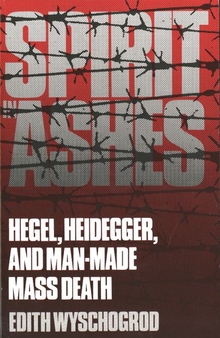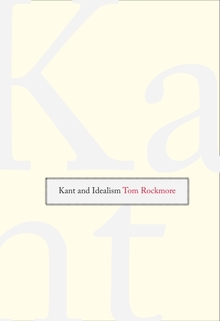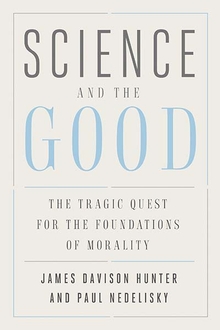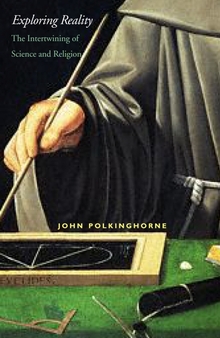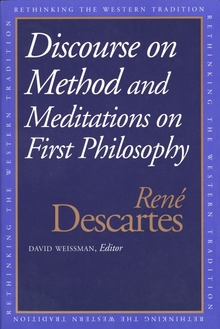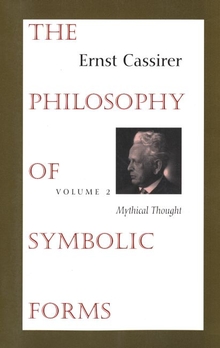Spirit in Ashes
WARNING
You are viewing an older version of the Yalebooks website. Please visit out new website with more updated information and a better user experience: https://www.yalebooks.com
Hegel, Heidegger, and Man-Made Mass Death
Edith Wyschogrod
Contemporary phenomena of mass death—such as Hiroshima and Auschwitz—have brought with them the threat of annihilation of human life. In this provocative and disturbing book, Edith Wyschogrod shows that the various manifestations of man-made mass death form a single structure, a “death-event,” which radically alters our understanding of language, time, and self. She contends that the death event has its own logic and driving force that she traces to pre-Socratic philosophy and to certain mythological motifs that recur in Western thought.
“Spirit in Ashes is one book in contemporary philosophy that should be read aloud and taken to heart by any professional or intellectual who purports to have a conscience.”—Carl Rasche, Journal of the American Academy of Religion
“A masterful blend of scholarship, originality, and serious passion.”—Robert C. Neville, Commonweal
“An original, insightful, and challenging work.”—Robert Burch, Canadian Philosophical Reviews
“Spirit in Ashes is one book in contemporary philosophy that should be read aloud and taken to heart by any professional or intellectual who purports to have a conscience.”—Carl Rasche, Journal of the American Academy of Religion
“A masterful blend of scholarship, originality, and serious passion.”—Robert C. Neville, Commonweal
“An original, insightful, and challenging work.”—Robert Burch, Canadian Philosophical Reviews
"An original work, one which returns philosophy to historical existence without loss of conceptual rigor and without compromising the author's singular mission."—Maurice Natanson, Department of Philosophy, Yale University
"The book's main thesis—that phenomena like Auschwitz and Hiroshima, the process Wyschogrod calls 'the death world,' have established a new historically conditional a priori that must transform the meaning of self, time, and language—is original, challenging and developed in a clear and forceful manner. . . . This is a book that commands respect."—Karsten Harries
"For depth of reflection we are privileged to have Edith Wyschogrod's Spirit In Ashes. . . . This is a masterful blend of scholarship, originality, and serious passion."—Robert C. Neville, Commonweal
"This study belongs to that rare category sometimes called the philosophy of history and sometimes the philosophy of culture. This integrates the several 'branches' of philosophy into a comprehensive and comprehensible whole, showing how ethics resonates with metaphysics and ontology, how aesthetics relates to science and logic, and providing a perspective on the arts and sciences of our world, and rendering the whole intelligible. The great problems of time, the meaning of being and existence, the enigmas of truth and language, are all given their due. It is a singular achievement." —Alan Rosenberg and Ralph W. Sleeper, Simon Wiesenthal Center Annual
"An original, insightful and challenging work."—Robert Burch, Canadian Philosophical Reviews
"Spirit In Ashes is one book in contemporary philosophy that should be read aloud and taken to heart by any professional or intellectual who purports to have a conscience."—Carl Raschke, Journal of the American Academy of Religion
"An extremely important book that deserves very serious attention. No philosopher has subjected the phenomenon of man-made mass death to such a careful analysis. Thoroughly grounded in the complexities of contemporary philosophy and theology, Wyschogrod's argument raises questions that students of religion no longer can afford to ignore, The concluding words of the book make it clear that these issues are of more than intellectual concern: 'Since the IU has become social, its demand must also be read socially. The social I demands that the whole human community, whose possible extinction is part of the formation of the IU, persevere in existence. Post-modern selfhood must now be understood as living within the gambit of the tensions created by this demand. We refuse the challenge that Wyschogrod poses in Spirit In Ashes at our own peril."—Mark C. Taylor, Religious Studies Review
"The author's presentation should be gratefully received."—Gregory B. Smith, Review of Politics
"Wyschogrod reviews for her reader a variety of established philosophical positions on the meaning of death within human experience, and proceeds to show that the technological accomplishment of mass death in this century forces a fundamental reevaluation of the meaning of space, temporality, sociality, language, and the structure and meaning of the self."—Judith Butler, History and Theory
ISBN: 9780300046229
Publication Date: September 10, 1990
Publication Date: September 10, 1990
263 pages, 5 1/2 x 8 1/4

